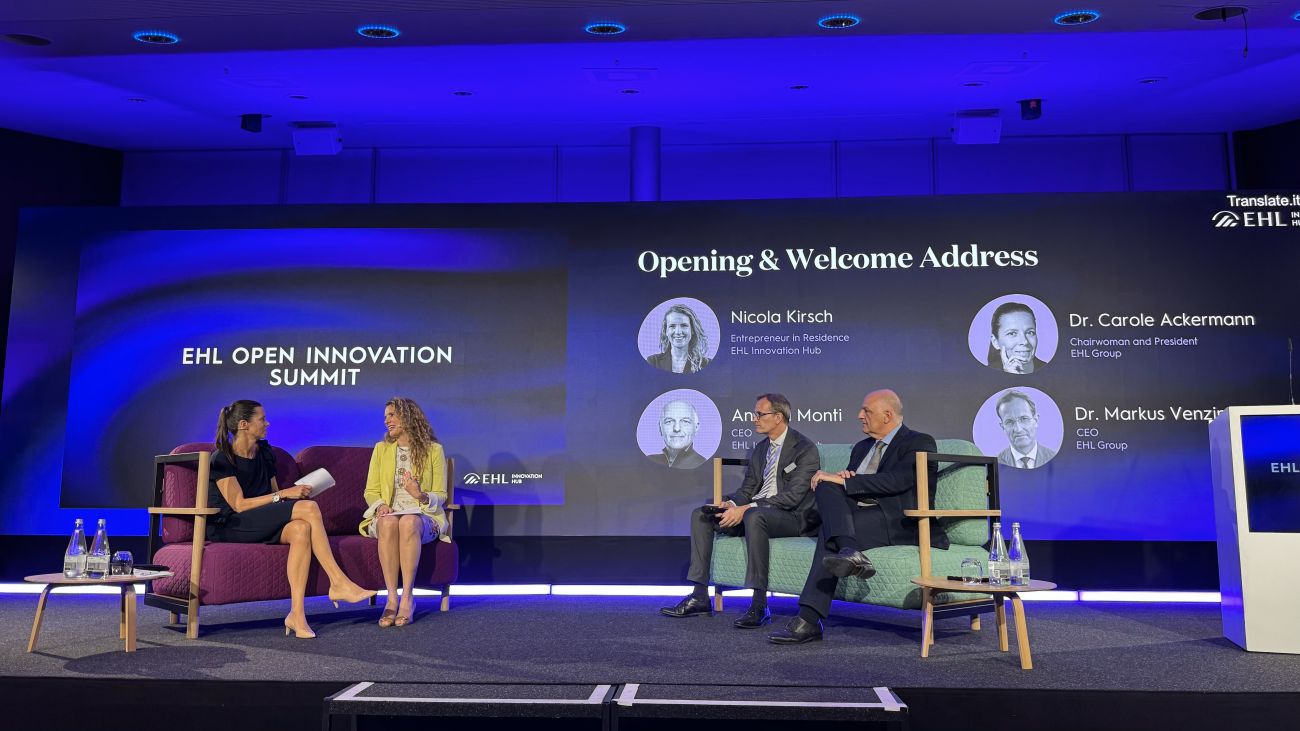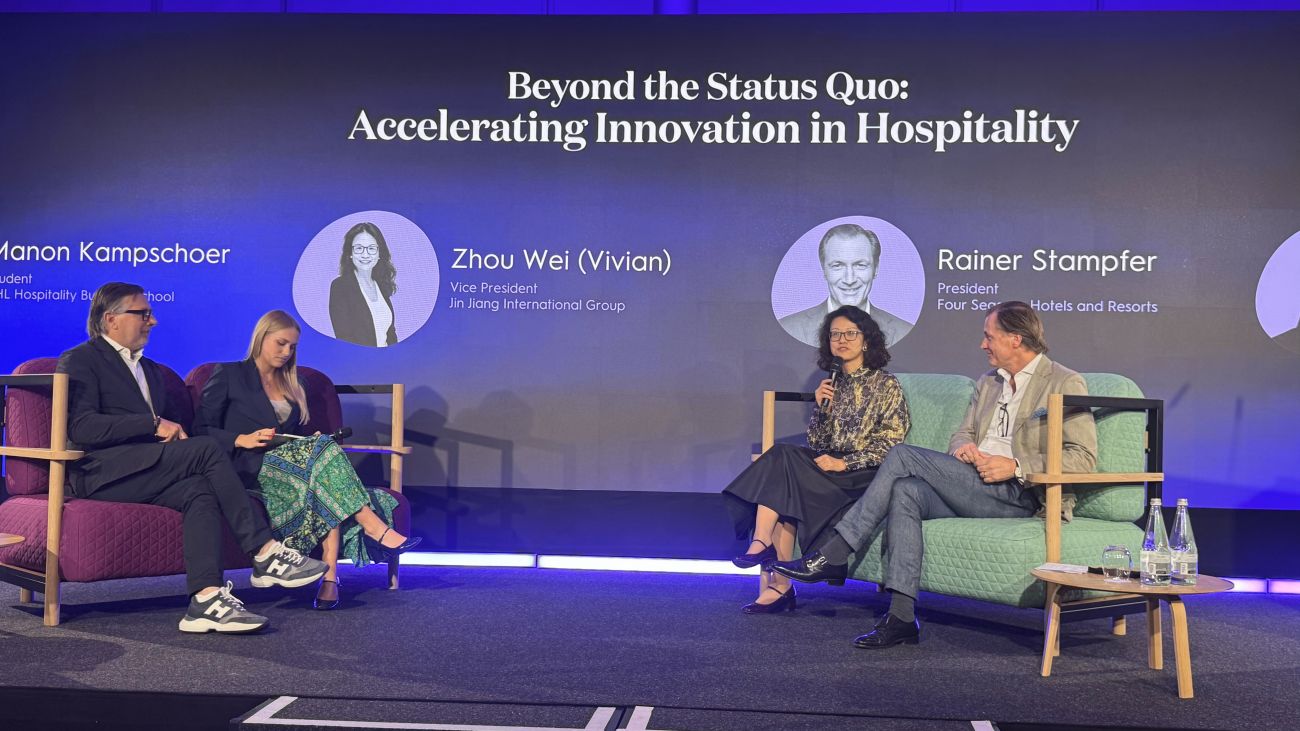
EVENT - EHL OPEN INNOVATION SUMMIT, TOWARDS THE HOSPITALITY OF TOMORROW
Over two days, EHL transformed its campus into a laboratory of ideas, bringing together professionals, students, and other experts to address the major challenges facing the hospitality industry.Category: Trends / Expert's advice Career Calendar - Interviews
Interview made by Vanessa Guerrier-Buisine on 2025-05-28
|
 From left to right: Dr Carole Ackermann, Chairwoman and President of EHL Group, Nicola Gryczka Kirsch, Head of Organisation of the EHL Open Innovation Summit, Markus Venzin, CEO of EHL Group, and Andrea Monti, CEO of EHL Next
The opening speech by Markus Venzin, CEO of EHL Group, set the tone:“EHL is the clear market leader in one category, in hospitality and hospitality competences. And I said, you know, we need to create a conference that aggregates brilliant minds around this notion.”
Among those minds was Thomas Meier, CEO of Jumeirah, who quickly illustrated how technology can enhance the guest experience without compromising its essence:“You can walk into our hotels, and you can opt not to show passports, credit cards... and you can do a check-in on an iPad facial recognition. Now again, luxury is choice. You come off a 14-hour flight, you have a meeting, you’re on a straight to your room – perfect. The same goes three weeks later, you come with your children... and we can offer that.” A concrete example of what AI-enhanced luxury could look like: more seamless, more efficient, but always human.
Three thematic tracks unfolded during this day and a half of the Open Innovation Summit – “future of food”, “regenerative economies”, and “luxury with impact” – allowing participants to explore the multiple dimensions of hospitality’s future, balancing operational excellence, environmental awareness, and social innovation.
Rethinking the logic of hotel design
This was undoubtedly what many of the EHL students, omnipresent throughout the event, were also seeking – like final-year student Manon Kampschoer, who moderated a noteworthy roundtable on hospitality innovation. Across from her, industry leaders such as Michael Levie, Co-founder of CitizenM Hotels, Rainer Stampfer, President, Global Hotel Operations at Four Seasons Hotels and Resorts, and Vivien Zhou Wei, Vice President at Jin Jiang International, openly discussed both the roadblocks and catalysts to true transformation in the sector.
“It’s time to rethink our spaces,” stressed Rainer Stampfer, calling for a move away from the rigid logic of hotel design. “We have long designed rooms around the television, as if it were the epicenter of the experience. Yet more and more guests don’t even turn it on.” For him, evolution lies in subtle yet meaningful changes – like modular in-room workspaces or the emergence of the “mobile concierge”, a role poised to replace the traditional front desk.
But innovation requires investment, time, and attentive listening – and sometimes, the courage to break from legacy models. Vivien Zhou Wei underscored this when describing the challenges faced by a hospitality group managing over one million rooms, mostly in the budget and midscale segments: “Innovation is not only about cutting-edge technology. It has to be scalable, so that a small hotel owner can adopt it.”
Michael Levie echoed the sentiment, emphasizing the importance of a business model built around a clearly defined audience and bold decisions, such as eliminating the back office, so every staff member is guest-facing. A vision widely shared by EHL students.
Toward a new narrative of luxury
Among the most anticipated speakers was Christian Clerc, President & CEO of Auberge Resorts Collection. Known for his sensitive and elevated approach to luxury, he reminded the audience that “the real surprise today lies in the unexpected, in the ability to positively disorient our guests.”
Using the Blue Sky resort in Utah as a case study, Clerc demonstrated how a hotel project can become a vehicle for local engagement. “There, the hotel is almost afterthought. The heart of the place is the horses rescued from slaughter, the permaculture farm, and the people who work there.”
His conclusion rang out like an invitation: “Simplicity is the future, and authenticity is the role that we all will be judged by.”
Thematic tracks to broaden horizons
One of the event’s highlights was the joint debrief of each track, revealing striking points of convergence. Xavier Destribats, COO EAME and the Americas at Kempinski Hotels, who closely followed the “luxury with impact” track, praised the diversity of profiles and perspectives: “What struck me is that we all agreed on one thing: luxury is above all an emotion. It can be a piece of bread and a drizzle of olive oil enjoyed in a simple yet inspiring setting.” For him, the industry is shifting toward a more experiential, less standardized vision.
An idea echoed in the other tracks. From the role of workplace dining as a lever for food system transformation to the gamification of regenerative hospitality projects, ideas flourished. Far from institutional discourse, the workshops allowed participants to build, reflect, and play – a spirit of co-creation that defines EHL.
An annual gathering in the making
“We don’t want to wait until next May to keep the momentum going,” declared Andrea Monti, President of EHL Next, as he brought the summit to a close. This finale, led by Nicola Kirsch, Andrea Monti, and Markus Venzin, confirmed what everyone already sensed: this summit was not a one-off event, but the beginning of a movement. The EHL Innovation Hub aims to unite a community of practice around regenerative principles and a positive vision for hospitality.
“We have everything – the tools, the ideas, the motivation. All we need now is a little more collective courage,” said Diane Binder during the debrief session, met with a wave of applause.
The next rendezvous for EHL Open Innovation Summit is set for May 2026. Until then, the seeds planted in Lausanne are already beginning to sprout.
Interview de Nicola Gryczka Kirsch, Head of EHL Open Innovation Summit
Journal des Palaces: Why did you launch this event, and how did you decide on the three themes for this first edition?
Nicola Kirsch: We realized that EHL was increasingly being looked to for answers: What are the trends? Where are we going? How do we support the transformation needed not only in hospitality, but across industries in this fast-changing world? That’s one of the main reasons for launching a gathering like this.
When we started thinking about it, we wanted something future-oriented – and that meant innovation, in many shapes and forms. This was not meant to be a start-up or scale-up event, but a broader take on innovation.
Instead of picking isolated topics like AI or tech, we did an industry consultation to define deeper themes that needed exploration. That’s how we landed on the three thematic tracks. AI, tech, and business model innovation are actually embedded in all of them.
How many people took part in the Summit, and what was their profile?
We reached 400 participants. Initially, the goal for this pilot year was to have 250, a smaller event – but interest was so strong we decided to expand.
The mix included industry professionals, innovators, and 20% students – both from EHL and other universities.
What are the first feedback on the event?
Honestly, feedback has been overwhelming. People were excited about the energy, the quality of speakers and content – especially on day one.
They also appreciated the practical aspects of working together during workshops.
People liked the balance of learning, inspiration, cross-industry exchange, and use cases with lessons learned.
The format of conferences, aspirational roundtables and workshop challenges created a very interesting dynamic. What are your key takeaways from the two days?
It’s possible – if we come together. In-person gathering is still crucial. Creating spaces of well-being, like the regeneration walk or musical moments, helped people feel grounded. That’s essential when addressing complex challenges.
Day one was about inspiration – setting the context, identifying trends. Day two focused on co-creation and pitching.
What stood out most: the right people were in the room, they were motivated, and they genuinely want to do good for society and the planet.
My biggest takeaway: hospitality can be a powerful catalyst to drive change in the world. We often underestimate that.
What are the hub's next hospitality projects?
There’s a tension in each of the three tracks – like sustainability versus luxury. Where do we draw the line? What do we change, what not? Redefining luxury is essential.
It’s the same for regeneration: how do we balance profit with impact?
And in food, it’s between authenticity and innovation – from simple, local ingredients to lab-grown alternatives.
Looking ahead, we’ll continue this momentum. In May 2026, we’ll be back with the next Open Innovation Summit. In the meantime, we’ll keep building our community with smaller events, quarterly updates, and collaboration.
 From left to right: Michael Levie, Co-founder of CitizenM Hotels, Manon Kampschoer, EHL Student, Vivien Zhou Wei, Vice President at Jin Jiang International, and Rainer Stampfer, President, Global Hotel Operations at Four Seasons Hotels and Resorts |
|


